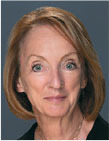
Profiles In Professional Development
BY , MS, BSN, RN, AND EDNA B. CLIFTON, MBA, BSN, RN
Learning does not stop when you finish your degree. It must be a lifetime commitment for you to continue in your career no matter what path you choose. Choosing to advance your career is a decision that requires significant planning. First and foremost, you need to identify your goals. Do you want to achieve specific expertise in a certain area, or do you want to move to an entirely different career path? In this article we look at how two nurses grew in their careers and what contributed to their advancement.
BARBARA LEACH, MS, BSN, RN
There was never anything else I was going to be other than a nurse. I loved the idea, and I was so lucky to go directly into a nursing program right out of high school. I had wonderful teachers, and they were such great examples, showing me the road to take every opportunity to learn and take chances, and I’ve done that all of my career.
My first job was as a pediatric staff nurse on the evening shift. In this role, I quickly became responsible for orienting new staff because I loved teaching and with this, I had to continue my learning. When the opportunity came up to become a cardio-pulmonary PROF E S S IONAL D E VE LOPMENT resuscitation (CPR) instructor and teach hospital staff, I jumped at it. Through continued study, I worked my way up to becoming an instructor trainer.
That opportunity to teach CPR led to my first business venture outside the hospital. I established a company that provided CPR training in the community. I taught courses in parks, preschools, dentist offices and other venues. That business flourished for over 20 years! Soon after I was asked to teach CPR in the hospital, the opportunity opened for me to become the shift educator. In that role, I coordinated orientations for all shifts, which included teaching the required pharmacology class to licensed vocational nurses (LVNs) who were learning to give medications. At this point, I realized I needed more education to hone my teaching skills.
I enrolled in a series of courses at the University of California Berkeley extension and obtained my community college teaching credential. These classes were so influential on my success as a nurse and educator. This program required me to teach in my area of work (nursing) to my classmates who were auto mechanics, photographers, artists home economists, etc. As a result of this training, I had the chance to do education and administration on a full-time basis. This is just another example of how courses that may not lead to a degree can provide a boost to your career.
When the first associate degree (AA) to bachelor of science in nursing (BSN) program in the state began, I was first in line. I knew having this BSN was an important credential that would open more doors and increase my success in achieving more advanced positions in nursing. I completed my BSN, and it wasn’t long until I was eligible for a director position. This provided an incentive for me to resume my learning initiative. I continued my studies and achieved American Nursing Credentialing Certification (ANCC) as a nurse executive.
For several years, I held the role of special project coordinator. This position offered a variety of learning and teaching opportunities. I learned how to develop early versions of electronic health records (EHRs), which encompassed order entry and charting. I was also exposed to a variety of jobs. I even had the opportunity to teach adult education for the local school district, where I taught classes for health unit coordinators.
The opportunity to move to case management became available, and I was ready for a change of pace. My hospital system needed a manager and leader for its case management department. The responsibilities included budgeting and staffing across three hospitals in our system. In this new role, I realized I needed to learn more about case management (CM). I joined professional organizations and took every CM education course I could find. Since CM was a totally new role for me, I knew I had to develop my expertise and obtain credentials to support that. I did take the ANCC RN-BC and the ACM exams to establish my role as a leader in CM. As a result of my certification work, I was instrumental in developing systemwide policies that offered rewards and benefits to certified staff in every department who earned their certifications.
After several years as the director of case management, I had an opportunity to move to the corporate education office. The hospital system needed someone to develop a CME certification process and to support the ANCC programs. With my background in education and case management, I was a prime candidate for this position. Here I learned how to develop programs on a learning management system platform and influence education programs across the health system. This also allowed me to use my adult learning skills that I learned when I obtained my teaching credentials from the University of California.
My advice is to take advantage of every education opportunity even if it does not directly apply to your current position. The things you learn qualify you for tomorrow’s job, or they may add a new idea for a better way to do today’s job. You never know.
EDNA B. CLIFTON, MBA, BSN, RN
When setting your career goals, it is helpful to engage a mentor. This is an individual who is a seasoned professional that holds values similar to yours. This person can provide guidance for certifications and education you need to achieve your goals. They also can assist you in exploring available opportunities and financing.
I was fortunate to be able to attend a bachelor’s in nursing (BSN) program right after high school. I had a cousin who was a nurse and served as my mentor. Her advice to me was take the time to get my bachelor’s early in my career as it would open opportunities in the future. I happily took her advice and completed my BSN.
I started my nursing career in a large teaching hospital that offered educational tracks to train us for specialty areas. I opted for the critical care track, specific to medical and coronary critical care. These courses provided me with the training needed for me to function effectively in these areas early in my career. After two years working in these areas, I had the opportunity to begin teaching nurses to prepare them to work in the critical care areas. I also developed a mentoring program that assisted new graduates to transition into the role of a professional nurse. Having the bachelor’s and the expertise gleaned from continued education courses opened opportunities to lecture at state and national seminars.
After 5 years of teaching, I began to become frustrated because I was teaching the ideal to students, but the systems in which they worked needed to change, and the only way that could happen was for me to move into administration where I could influence those changes. At that time the bachelor’s was adequate to be eligible to take on an administrative position. However, it did not take long before that changed, and to maintain that role a master’s was required. I began to explore programs that would best prepare me to continue in administration, which was my professional goal.
In choosing how to advance my career, I explored several master’s programs and evaluated how they could help me achieve my goal to broaden my business and finance experience to solidify my role as a nursing leader and an integral member of the executive team. I looked into master’s programs in nursing, business and public health. I began my studies in public health, but after taking several courses, I realized the curriculum did not offer the business and finance courses I felt I needed. So, I enrolled in a program to complete my master’s in business administration. I do admit this transition was quite challenging. The course of study was very different and difficult, but I knew this program clearly met my professional goals.
When I finished my master’s in business administration (MBA), I chose to move into a different healthcare setting. I began work in the field of hospice. I was fortunate to meet their chief financial officer, who saw the value of having a nurse with a business degree because of how the hospice Medicare benefit regulated payment for care their patients received. In this role as director of reimbursement, I had to dig into the Medicare regulations governing hospice payment and I had to educate insurance case managers to how hospice functioned and how it differed from home health. This role allowed me to apply my clinical and financial skills.
The MBA program also had a strong quality improvement component. After graduation, I kept in touch with the professor who taught the course. Since he knew my interest in this topic, he referred me to the local school system’s Quality Academy. This was a program that recruited business professionals to assist schools in applying for the state’s Sterling Award for quality and performance improvement. Since school administrators were not versed in the quality improvement process, business professionals mentored administrators to prepare them to fill this role in the future. I volunteered for 2 years, and this experience opened doors for jobs in quality improvement. As a result, I moved to another hospice organization as their director of quality improvement and compliance.
Having the business, quality and nursing background, I chose to work for the Quality Innovation Network, Quality Improvement Organization (QIN-QIO) when the opportunity presented. In this role I was charged with working with healthcare providers to review data and develop quality action plans to improve patient clinical outcomes, reduce readmissions and reduce costs. In this role I was able to sharpen my skills in analyzing and presenting data to healthcare leaders across the state.
Throughout my career I never passed up an opportunity to learn new skills through higher education, work or volunteer experience. Doing this opened doors I never realized would be available. I encourage you to do the same.



